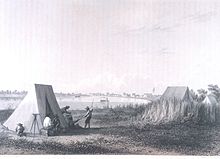Cortina War
| Cortina Troubles | |||||||
|---|---|---|---|---|---|---|---|
 |
|||||||
|
|||||||
| Belligerents | |||||||
|
|
|
||||||
| Commanders and leaders | |||||||
|
|
|
||||||
| Strength | |||||||
| United States Army Confederate States Army Texas Rangers Local militia |
Unknown precisely | ||||||
| Casualties and losses | |||||||
| 31 killed and wounded | 216 killed | ||||||
The Cortina Troubles is the generic name for the First Cortina War, from 1859 to 1860, and the Second Cortina War, in 1861, in which paramilitary forces, led by the Mexican rancher and local leader Juan Nepomuceno Cortina, confronted elements of the United States Army, the Confederate States Army, the Texas Rangers, and the local militias of Brownsville, Texas, and Matamoros, Tamaulipas. According to author Robert Elman, Juan Cortina and his followers were the first "socially motivated border bandits," similar to the Garzistas and the Villistas of later generations. The fighting took place in the Rio Grande Valley area, which straddles the international border of Texas and Mexico.
The First Cortina War began at Brownsville on July 13, 1859, when Cortina shot the town marshal, Robert Shears, in the arm for his brutalizing of Cortina's former employee, Tomás Cabrera. Tension increased between Cortina and the Brownsville authorities, and on September 28 he raided and occupied the town with a posse of between forty and eighty men. His enemies, however, had fled, and during the occupation of Brownsville, he issued a famous proclamation to reveal his intentions to both communities. "(...) There is no need of fear. Orderly people and honest citizens are inviolable to us in their persons and interests. Our object, as you have seen, has been to chastise the villainy of our enemies, which heretofore has gone unpunished. These have connived with each other, and form, so to speak, a perfidious inquisitorial lodge to persecute and rob us, without any cause, and for no other crime on our part than that of being of Mexican origin, considering us, doubtless, destitute of those gifts which they themselves do not possess. (...) Mexicans! Peace be with you! Good inhabitants of the State of Texas, look on them as brothers, and keep in mind that which the Holy Spirit saith: "Thou shalt not be the friend of the passionate man; nor join thyself to the madman, lest thou learn his mode of work and scandalize thy soul."
...
Wikipedia
